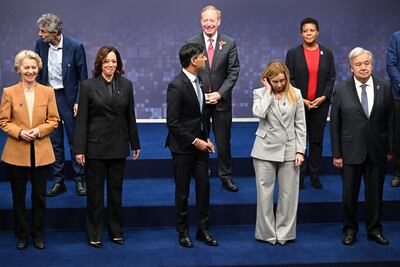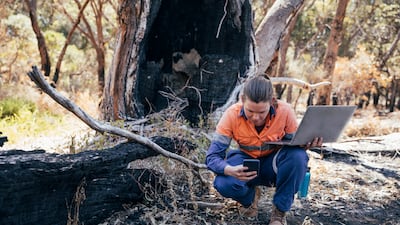Live updates: Follow the latest news on Cop28
The world of AI and machine learning is turning its attention to climate change, hoping an era of open data will speed up the journey to net zero.
The Cop28 summit in the UAE will be shown cutting-edge technology such as software that learns what solar panels look like and spots them from satellite images.
Meanwhile, a first ever “global stocktake” of progress towards the world’s climate goals includes a call for “rigorous accountability” in how companies report their carbon footprint.
Scientists leading a push to put these two things together told The National that getting AI to crunch the numbers would mean the climate world can stop “arguing about very basic stuff”.
“Greenhouse gas and climate reporting has certainly lagged behind financial reporting,” said Prof Angel Hsu, the founder of the Data-Driven EnviroLab, who recalled using less-than-futuristic Excel spreadsheets in her early days working on emissions data.
She said getting climate data published in a digital-friendly way, rather than in glossy corporate brochures or PDF files, opens the door for AI to sift through it more easily – once it learns that “goals”, “targets” and “emission reduction pledges” basically mean the same thing.
“That’s basically how a Google search works,” she said. “If you type in ‘what are places that I can get Mexican food’, it can know that maybe Mexican and Latin food are pretty similar, or Mexican and Peruvian food, so then it would pull up all these different searches related to different types of Latin food.
“It’s that technology, which has been established, that now we’re starting to apply to the climate change domain and climate data and information domain.”
World leaders have repeatedly highlighted climate change as an area where AI could benefit humanity, including at a recent AI safety summit at Britain's Bletchley Park, even as they warn of its dangers in other fields.
A report by Google claims AI’s skills as a forecaster and number-cruncher could knock five to 10 per cent off global emissions by 2030.
The Mohamed Bin Zayed University of Artificial Intelligence in Abu Dhabi last week unveiled its own climate-focused large language model, Jais Climate, which speaks English and Arabic.
Scientists at Prof Hsu’s data lab also recently unveiled a ChatGPT-like bot called ChatNetZero, which can answer climate-related questions by scouring through corporate green pledges.

The UN is eyeing up new transparency guidelines for companies, with “accountability” one of the topics set to be discussed on day five of Cop28 as part of a schedule of themed days.
Before Cop28, which opens in Dubai on Thursday, the UAE presidency has encouraged the private sector to sign up to a Net Zero Transition Charter that calls for “science-based, credible, and transparent” emissions targets.
Energy model
Delegates in Dubai will also be shown a new data tool that models the future of energy systems, showing for example that more efficient power grids could trim $3 trillion off the cost of wind turbines, solar panels and so on.
The model being launched at Cop28 by TransitionZero, a tech non-profit, draws on satellite data and a model trained to recognise solar panels and electric substations, some of which may not be public knowledge.
Solar power is growing rapidly but there is no methodical tracking of where it exists and in parts of Asia there is little data at all, said TransitionZero’s founder Matt Gray.
“Until the onset of cloud computing and advances in satellite imagery it has been very difficult to produce these models and run them at scale,” he told The National.
“We’ll need to make decisions at scale and it’s just so hard to do that when data availability and transparency is just so limited.”

He said creating a “common evidence base” of open data could save negotiators time at Cop summits, including on the perennially thorny issue of rich countries funding climate action in the developing world.
“A lot of time spent when it comes to negotiating climate finance is around monitoring, reporting and validation, so just understanding that stuff is going to get done and what low-income countries want to do is credible,” he said.
“That’s where good data can come in, and publicly available data can come in, just to reduce those barriers so they’re not arguing about very simple stuff like what is the cost of solar in the country or what is the utilisation rate of a solar farm in the country.
“This is all stuff that we don’t have time to arguing about, and we shouldn’t be arguing about, given the scale of the investments required and the time in which we’ve got to do it.”


